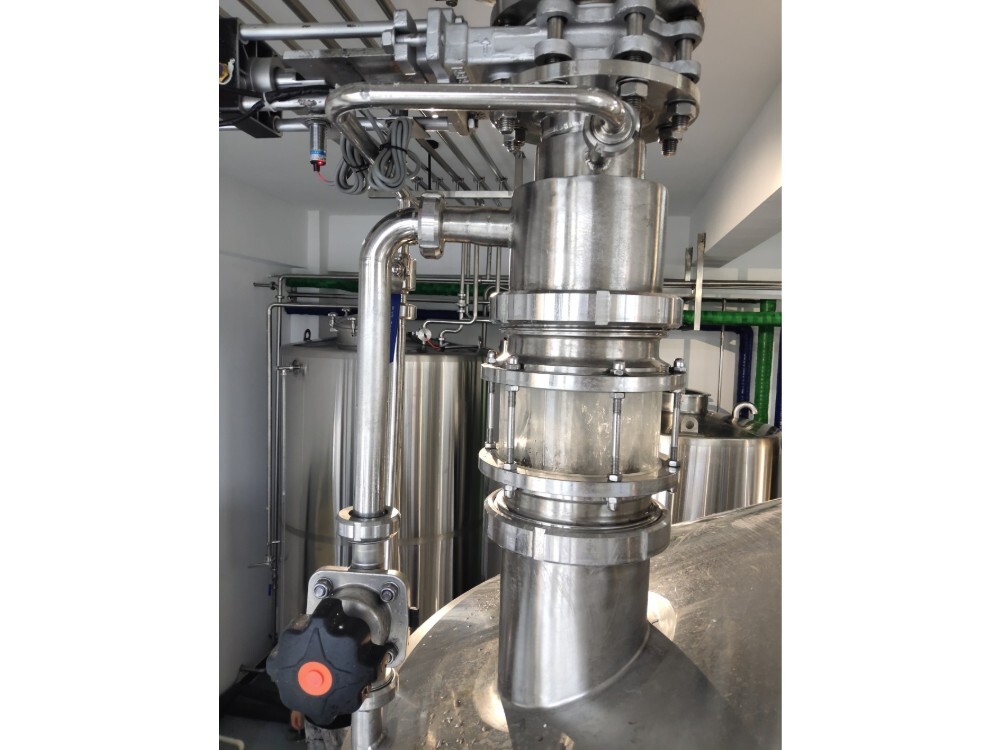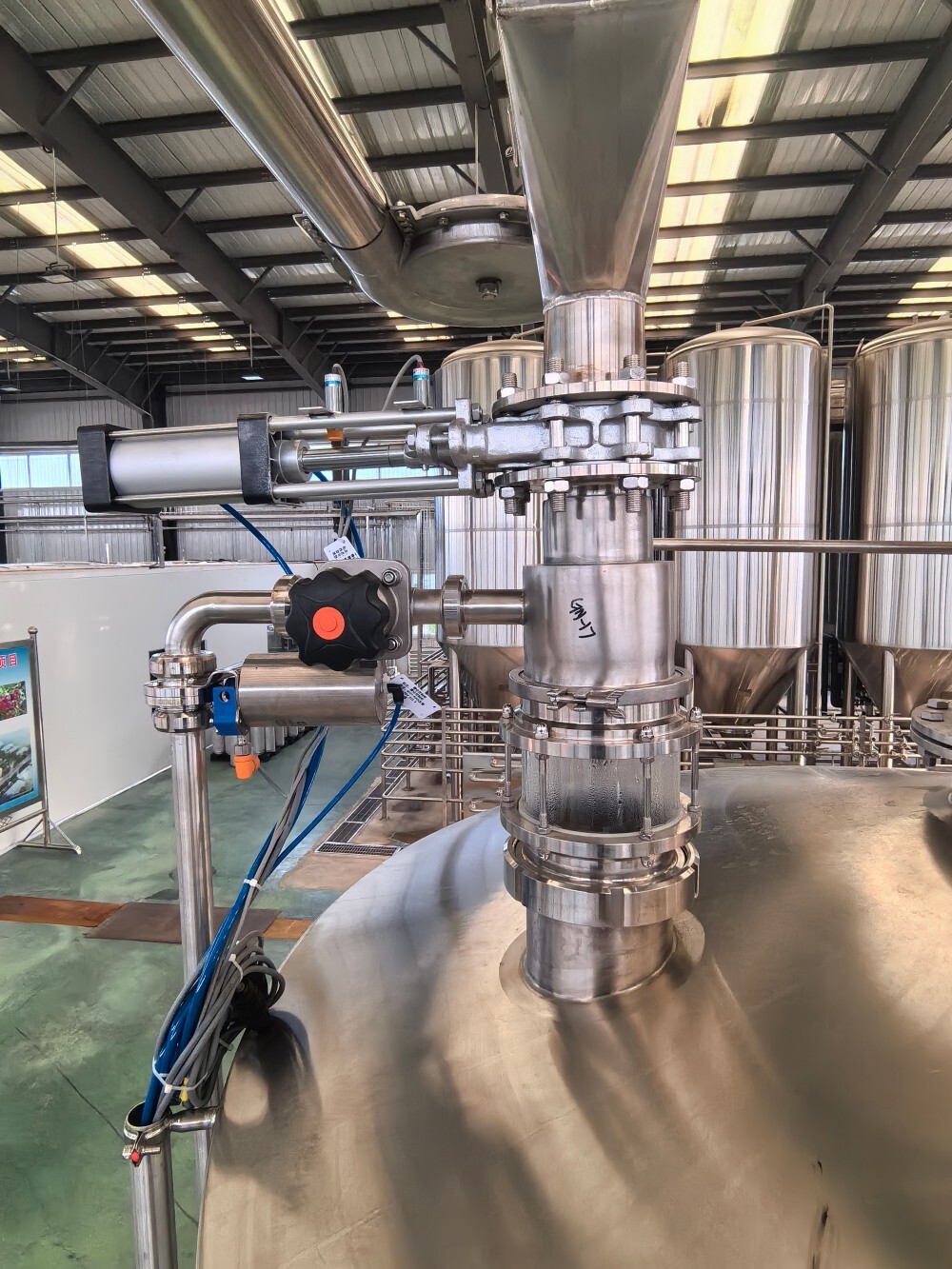OUR Products
Grist Hydrator
The brewhouse system is equipped with a grist hydrator, and the malt powder and water can be fully mixed.
The proportion and uniformity of the mixing of malt powder and water directly affect the brewing effect, and the 360° all-glass visual mixing of material and water mixer can be used to observe the mixing degree and process of material and water, and realize automatic control. Adjust the flow of materials and water in time to effectively prevent wheat flour from flying and agglomerating. The system comes with a CIP cleaning system, which avoids the hygienic cleaning problems caused by the mixing process of material and water. The overall design increases the uniformity of the mash stirring and reduces the load on the mixer.
If you need help configuring a system to suit your needs,
we will help you find the right one for you!
The Grist hydrator is a specialized piece of equipment used in the brewing industry to accurately mix water with various brewing materials, including malt, hops, and other adjuncts. This equipment ensures the precise blending of these components, which is a critical step in the brewing process to create the wort, the liquid that serves as the basis for beer production. The grist hydrator is a crucial piece of equipment that ensures the precise and consistent blending of water with brewing materials, contributing to the overall quality and consistency of the beer produced by the brewery.
- Our material water mixer is your gateway to precision. We understand that every drop and gram of matter is brewing. Our system ensures an exact water-to-material ratio, so you get the same incredible results with every batch.
- Consistency is at the heart of brewing excellence. With our system, you can count on a consistent and uniform mixing process that leads to beers with a uniform taste, aroma, and quality across all your brews. No deviations, just superior consistency.
- Your brewing recipes are unique, and our material water mixer adapts to your specific needs. Customize the system to accommodate different malt types, hop varieties, and adjuncts, empowering you to explore and create new flavor profiles.
- Our system integrates seamlessly with your existing brewery equipment, ensuring that the precise ingredients are mixed at the right stages. The synergy optimizes your brewing process, fostering synchronization and efficiency at every step.
- The grist hydrator provides a high degree of consistency in the mixing process, resulting in consistent taste, aroma, and quality for all batches.
- Grist hydrator settings can be adjusted to accommodate different malt types, hop varieties, and additives, allowing for flexibility and creativity in beer production.
- Grist hydrator maintain quality standards by providing accurate and repeatable mixing, producing beer that consistently meets customer expectations.
- Grist hydrator ensure precise control of the water-to-feed ratio, allowing breweries to achieve consistent and repeatable results for every batch of beer.
ZYB Craft is a professional manufacturer of yeast systems, we can provide customers with complete turnkey services, including detailed brewery layout and equipment drawings, etc.
Our experienced technical team will serve you at every step, from designing commercial fermentation tank layouts, individual drawings, and manufacturing to installation, commissioning, and on-site training.
No matter the space, time, or budget challenge, we can deliver and install the equipment you need to maximize beer production while maintaining the integrity of your brewing process.
Please contact us for the latest solutions and quotations for the brewery equipment.
Frequently Asked Questions
What Is Brewery Equipment?
The brewery equipment is specialized equipment used in the beer brewing process, typically used in commercial breweries, but also used by home brewers. It can consist of a range of items ranging from basic to complex, all designed to facilitate the brewing process and produce high-quality beer.
The equipment used in breweries can vary in size and complexity depending on the size of the operation. Larger commercial breweries may use automated equipment controlled by computers, while smaller craft breweries may rely on more manual processes. The quality of brewery equipment directly affects the quality of the beer produced, making it a very important aspect of the brewing process.
What Is The Price Of Brewery Equipment?
The price of brewery equipment can vary widely, depending on several factors, such as the size and complexity of the brewing operation, the specific equipment required, and the level of automation required. Costs can range from a few hundred to a few thousand dollars for basic home brewing equipment, to tens or even hundreds of thousands of dollars for small craft breweries.
A large commercial brewery with advanced automation and high-volume production capabilities can cost millions of dollars. If you plan to open a brewery, you can always consult us. Our engineers will provide you with accurate brewery equipment quotes based on your specific needs and budget.
What Material Is The Brewery Equipment Made Of?
Brewery equipment can be manufactured from a variety of materials, depending on the specific parts of the equipment and the intended use of the machine. Some common materials used in brewery equipment include:
- Stainless Steel: This is the most commonly used material in brewery equipment because it is durable, corrosion-resistant, and easy to clean.
- Copper: Copper was used in the past to make brewery equipment due to its good thermal conductivity. However, copper is not commonly used today due to its relatively high cost and its reaction with acidic solutions.
- Aluminum: This lightweight metal is sometimes used in brewery equipment due to its affordability, but it’s not as durable as stainless steel and is more prone to corrosion.
- Plastics: Certain types of plastics, such as polyethylene and polypropylene, are used in some brewery applications due to their low cost and chemical resistance. But they are not as strong as metal, so more frequent replacements may be required.
- Glass: Glass is also used in some specialty brewery containers, such as fermenters for sour beer, but is less common due to its fragility and high cost compared to other materials.
The specific materials used for brewery equipment will depend on the functionality, size, and other requirements of the equipment.
What Does Brewery Equipment Use For Cleaning?
The brewery equipment is often cleaned using specialized cleaners designed to remove organic and inorganic residues without damaging the equipment or leaving any harmful residues. These cleaners are usually alkaline or acidic solutions that are circulated through the brewery equipment along with hot water to break down and remove any buildup from previous batches. Some common cleaning agents used in brewery equipment include:
- Caustic Soda: An alkaline solution used to dissolve organic residues from the brewing process.
- Acid Mix: An acidic solution used to dissolve mineral deposits produced during the brewing process and to sanitize equipment.
- Chlorine-based disinfectant: used to kill bacteria and other microorganisms on the surface of brewery equipment.
- Peracetic Acid (PAA): A disinfectant that is effective against a wide range of microorganisms and does not leave any harmful substances behind.
Which cleaner to use will depend on the type of equipment being cleaned, the type of residue being removed, and any regulations or guidelines that must be followed. It is important to use only approved cleaners and follow proper cleaning procedures to ensure brewery equipment is thoroughly cleaned and safe for subsequent batches.
How Long Can Brewery Equipment Last?
The lifespan of brewery equipment can vary widely based on a number of factors, depending on factors such as equipment quality, maintenance, and frequency of use. Generally speaking, quality stainless steel brewery equipment that is properly cleaned and maintained can last for many years or even decades. However, some components of brewery equipment may need to be replaced, such as rubber gaskets, hoses, and other worn parts.
The brewery equipment is regularly inspected and maintained to ensure it remains in good working order and any damaged or worn parts are replaced as needed. Regular cleaning and maintenance will help extend the life of your equipment and prevent any other problems during your brewing process. Ultimately, the lifespan of brewery equipment is influenced by several factors and varies from equipment to equipment.
How Much Space Is Needed For Brewery Equipment?
The amount of space required for brewery equipment can vary depending on the size and size of the brewing operation, as well as the specific equipment used. Generally speaking, small home brewing facilities only need a few square meters to accommodate, while larger commercial breweries may require hundreds or even thousands of square meters. Some factors that may affect the space required for brewery equipment include:
- Size And Number Of Brewing Containers: Larger containers require more space to accommodate, as do multiple containers.
- Storage Space: Additional storage space for storing raw materials, finished products, and other supplies is also required in a brewery.
- Available Ceiling Height: Some taller brewing equipment, such as fermenters or bright tanks, may require a certain minimum headroom height.
- Auxiliary Facilities: Additional space may be required to accommodate auxiliary facilities, such as packaging lines or laboratory areas.
If you are planning to open a brewery, feel free to contact us. ZYB Craft will provide you with accurate brewery equipment quotations and determine suitable space requirements for you according to your specific needs and budget.
Do You Have Any Question?
Tell us about your brewery equipment requirements!
At ZYB Craft, we’re dedicated to bringing your brewery vision to life. Our expert team of brewers, engineers, and craftspeople is ready to design and manufacture the perfect equipment for your brewing operation. Whether you’re just starting or expanding, we’re here to help. Please leave your specifications, and our team will get in touch to discuss your project in detail. We’ll work closely with you to create equipment that meets your unique needs and budget.
*Rest assured, your information will be kept confidential and used solely for the purpose of assisting you with your brewery equipment needs. We look forward to brewing success together!


